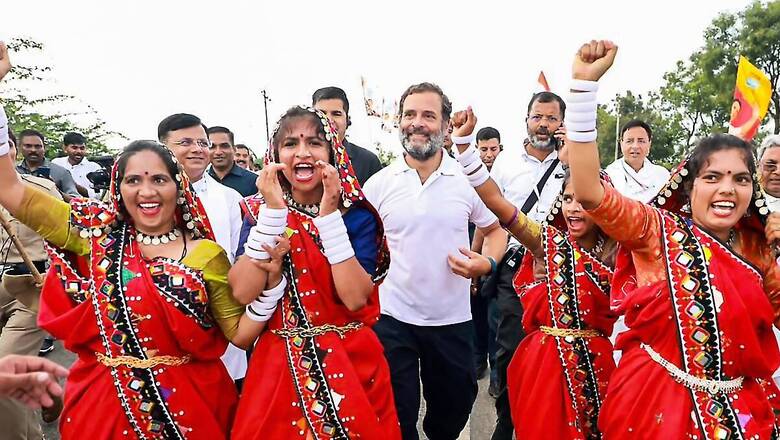
views
An anti-incumbency surge gave the Congress a decisive mandate in Karnataka its first victory in a major state in five years. After a long electoral drought, the party’s triumphalism is understandable, but it has a long way to go before it is battle-ready for 2024.
Granted, the ‘Modi magic’ did not work, any more than it did in Himachal Pradesh in 2022, West Bengal in 2021, Delhi in 2020 or Bihar in 2015. In an assembly election, a charismatic national leader can influence outcomes only when there is no major local electoral issue and a large number of voters are undecided.
One can safely conclude that in Karnataka, where corruption was a central issue, voters were far from undecided — they had made up their minds to evict the BJP. Thus, reports of a last-minute BJP surge proved to be a mirage and expectations of a close contest possibly resulting in a hung assembly were belied.
Apart from public anger, Muslim consolidation worked in favour of the Congress, judging from the increase in its vote share, largely at the expense of the Janata Dal (S). Plus, Karnataka Congress leaders, to their credit, sank their differences and worked together. At the end of the day, it was a well-deserved victory and an equally well-deserved defeat.
For the BJP, it’s time to rethink Karnataka. The party fought, and fought hard, against tremendous odds. The question is why the odds existed in the first place. After all, it has beaten anti-incumbency time and again. What went wrong in Karnataka?
First of all, the BJP has not managed to build the kind of social coalitions it has crafted in the north, except in Coastal Karnataka. The well-entrenched Ahinda (OBCs-Dalits-Adivasis-Muslims) combine led by Congress stalwart Siddaramaiah has proved highly resilient, leading to the BJP’s over-dependence on its Lingayat leaders, notably BS Yediyurappa.
The architect of the BJP’s Lingayat vote-base has been both an asset and a liability for the BJP. The central leadership has dealt with him over the years through negotiation and compromise. His privileged position was underlined in multiple ways. He was allowed to take oath as CM in 2021, in contravention of the unwritten rule that leaders retire from office at 75. The allegations of corruption and land scams against him were overlooked. And in a party that claims to abhor dynasticism, he relentlessly promoted his sons.
Dissidence was taken lightly, even when party MLAs spoke out openly against the Lingayat strongman. He demitted office in 2021, but cast a long shadow over his successor Basvaraj Bommai. In the assembly polls, the BJP once again fell back on Yediyurappa. Although he had retired from electoral politics, he was at the front and centre of the campaign.
Secondly, Bommai proved ineffective in curbing corruption or presenting a picture of a dynamic government. Despite feedback from the state that corruption had snowballed into a huge issue, Delhi didn’t respond. Whether defections and dissension damaged the BJP is not yet clear, but the failure to address anti-incumbency certainly did, as the defeat of several ministers indicates.
Thirdly, the BJP’s efforts to make headway in the Vokkaliga-dominated Old Mysuru region failed, despite promising additional reservations to the community. The fact that its statewide seat-share declined all out of proportion to its vote share, indicates that it held on to its bastions but lost ground elsewhere.
Even as the BJP redraws its Karnataka strategy, the Congress must ensure that the spirit of cooperation among powerful state satraps continues, regardless of who becomes chief minister. It will also have to contend with the electorate’s tendency to vote against the ruling dispensation in the general elections!
Whether Rahul Gandhi’s Bharat Jodo Yatra had an impact on Karnataka will be determined only later this year, in the next round of assembly elections. In Rajasthan, Chhattisgarh and Madhya Pradesh, the BJP is on stronger ground, has higher stakes and is less prone to the pulls and pressures of state leaders.
It is there that the Congress will face its biggest test ahead of the 2024 Lok Sabha polls. The party must secure at least two of the three states before it can lay claim to leadership of a national coalition against the BJP, and challenge the ‘Modi magic’. The Karnataka results alone will not diminish the BJP’s prospects in 2024, or strengthen those of the Congress.
Bhavdeep Kang is a freelance writer and author of ‘Gurus: Stories of India’s Leading Babas’ and ‘Just Transferred: The Untold Story of Ashok Khemka’. A journalist since 1986, she has written extensively on national politics. Views expressed are personal.




















Comments
0 comment